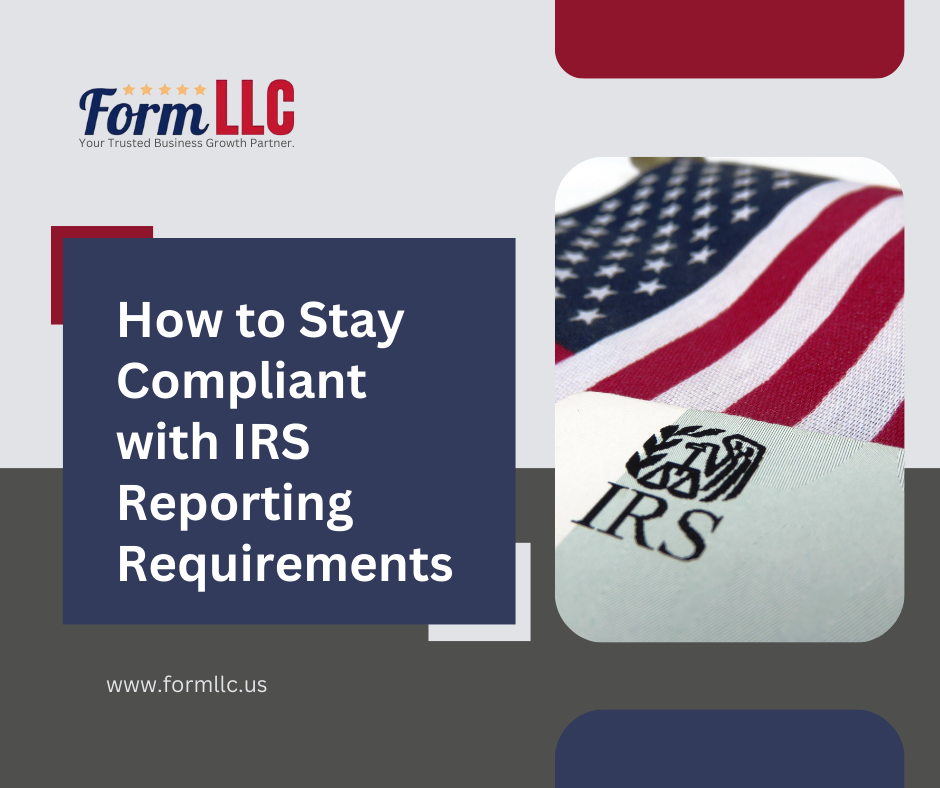
Staying compliant with IRS reporting requirements is crucial for non-resident business owners operating a US-based LLC. The IRS has specific rules and forms that must be adhered to, and failure to comply can result in significant penalties, fines, and even the potential loss of your LLC’s good standing. Here’s a guide to help you understand the key IRS reporting requirements and how to stay compliant.
1. Understand Your Filing Obligations
As a non-resident owner of a US LLC, your filing obligations depend on how your LLC is classified for tax purposes and the nature of your business activities. Most single-member LLCs owned by non-residents are classified as “disregarded entities” for tax purposes, meaning the LLC’s income is reported on the owner’s personal tax return. Multi-member LLCs are usually treated as partnerships, requiring different forms.
The main forms that you may need to file include:
- Form 1040-NR: The US Nonresident Alien Income Tax Return, used to report any US-sourced income and calculate your tax liability.
- Form 5472: Required for foreign-owned single-member LLCs to report certain transactions between the LLC and its foreign owner or related parties.
- Form 1065: If your LLC is classified as a partnership, this form is used to report the income, deductions, and other financial information of the partnership.
2. Filing Form 5472 for Foreign-Owned LLCs
One of the most important forms for non-resident LLC owners is Form 5472, which is used to report transactions between the LLC and its foreign owners or related parties. This form is particularly crucial because failing to file it on time can result in hefty penalties—up to $25,000 per year, per form.
Who Needs to File Form 5472?
- Single-member LLCs that are owned by a non-resident individual or foreign entity.
- LLCs with reportable transactions, such as capital contributions, loans, and other financial transactions with the foreign owner.
When to File Form 5472
- Form 5472 must be filed along with the LLC’s annual tax return by the due date, which is generally April 15th, with a possible extension to October 15th if needed.
How to File Form 5472
- Form 5472 is submitted alongside Form 1120, the US Corporate Income Tax Return, even if the LLC has no income. It’s crucial to ensure accurate reporting of all transactions to avoid penalties.
3. Report All Income Accurately
Accurately reporting your income is a fundamental part of staying compliant with the IRS. This means keeping detailed records of all income earned from your US operations, as well as any expenses related to your business. Misreporting or underreporting income can trigger an audit, which can be costly and time-consuming.
Tips for Accurate Income Reporting:
- Keep Detailed Records: Maintain organized records of all transactions, receipts, invoices, and bank statements.
- Use Accounting Software: Implement accounting software to track income and expenses automatically. This will help reduce errors and make tax preparation more straightforward.
- Understand ECI (Effectively Connected Income): ECI refers to income that is connected with a US trade or business and must be reported to the IRS. Be sure to differentiate between ECI and other types of income that may not be subject to US tax.
4. Pay Estimated Taxes if Required
Non-resident business owners are often required to make quarterly estimated tax payments if they expect to owe $1,000 or more in taxes when they file their return. This helps prevent underpayment penalties and ensures that you are meeting your tax obligations throughout the year.
Estimated Tax Deadlines:
- Estimated tax payments are typically due on April 15, June 15, September 15, and January 15 of the following year.
5. Stay Updated on Filing Deadlines
Missing IRS filing deadlines can lead to penalties and interest charges. It’s essential to be aware of the due dates for each form that your LLC needs to file. Setting calendar reminders or using tax software can help you keep track of these deadlines.
Common Filing Deadlines:
- Form 1040-NR: Due April 15, with an extension possible until October 15.
- Form 5472: Due with your LLC’s tax return, typically by April 15, with an extension possible.
- Estimated Taxes: Quarterly deadlines throughout the year.
6. Handle Withholding Requirements
For non-resident LLC owners, certain types of income may be subject to US withholding tax. For example, dividends, interest, and royalties paid to non-residents are often subject to a 30% withholding rate unless reduced by a tax treaty. Ensuring that the correct amount of tax is withheld and reported is an essential part of compliance.
How to Manage Withholding:
- Work with a tax professional to determine which income types require withholding.
- Use IRS Form W-8BEN or W-8BEN-E to certify your status and claim any treaty benefits.
7. Keep Up with Changes in Tax Laws
Tax laws are constantly changing, and staying updated on the latest IRS requirements is crucial for compliance. Changes in reporting requirements, filing deadlines, and tax rates can directly impact your LLC. Regularly reviewing IRS updates, subscribing to tax newsletters, or working with a tax professional can help you stay informed.
8. Seek Professional Guidance
Navigating IRS reporting requirements as a non-resident business owner can be complex. Consulting with a tax professional who specializes in non-resident taxation can provide valuable insights, ensure that you are meeting all your obligations, and help you avoid costly mistakes.
Conclusion
Staying compliant with IRS reporting requirements is critical to maintaining the good standing of your foreign-owned LLC. By understanding your filing obligations, accurately reporting income, meeting deadlines, and keeping up with changes in tax laws, you can ensure that your business remains compliant and avoids penalties. For more guidance on managing your LLC’s tax obligations, visit my personal website at Tousif Akram or explore our services at Form LLC.